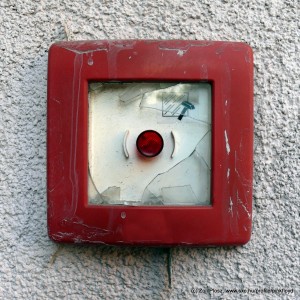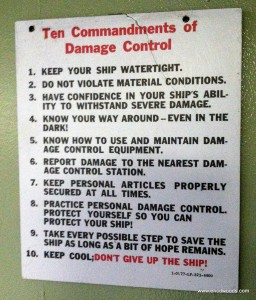 A long time ago, a friend told me that the difference between a good decision and a bad decision was having good information. When things are going well, we can often take the time we need to gather that information carefully, asking good questions, reviewing data, and consulting with others who might have more knowledge or experience than us.
A long time ago, a friend told me that the difference between a good decision and a bad decision was having good information. When things are going well, we can often take the time we need to gather that information carefully, asking good questions, reviewing data, and consulting with others who might have more knowledge or experience than us.
But when crisis hits, we often don’t have the luxury of time. Instead, we have to rely on the bank of knowledge and experience already in our heads, synthesizing that information in real time to come up with good decisions in short order.
While the first three of the Navy’s Ten Commandments of Damage Control focus on the power of a solid ship to withstand attack and failure and collision, the next three focus on the power of information to help you navigate difficult circumstances.
4. Know your way around—even in the dark!
Try it, just for a minute. Tonight when it’s dark outside, turn off the lights in your house and walk around. Or, put on a blindfold. Can you navigate your normal routes—to the bathroom, the kitchen, the TV remote control? In crisis, the simplest things we do every day can become vastly more complicated.
Inside the depths of a ship like the USS Midway are a maze of passages, doors and hatches. Even with minimal lighting, these can look familiar and provide for routine passage. But when the power goes out, they become pitch black. The familiar signage and landmarks become invisible.
When we face crisis, in life and work and ministry, having a mental map of your personal or organization’s key operations and guiding principles well help you get through it. Here are some key things you and your team should know in the dark:
- Where are we going? Knowing your mission and vision, and being able to articulate it without reading it, ensures that it is embedded in your thoughts and decisions. This is true for families too. Where is your family headed? Are you working to get out of debt? Saving for college? Raising young children?
- Who is on my team? Do you know who in your organization you should go to for each circumstance? Understanding the gifts and experiences of each team member will help you to turn to the right people.
- What resources do we have? After remodeling my house two years ago, I realized the tremendous value of having the right tools. It can make a difficult job much simpler, and dramatically improve the outcome. Often, we have resources available to us within our organization or networks that we overlook or are unaware of. Knowing these resources can improve the speed and quality of outcome in a crisis situation.
5. Know how to use and maintain damage control equipment.
Again, the resources you have can be tremendously helpful in resolving a crisis. But most of these tools require practice and familiarity.
At camp, each of our high adventure staff is trained in rescues and takedowns. They are skills they don’t use frequently, but are of tremendous value when a camper freaks out 30 feet off the ground. But simply having been trained in these skills isn’t enough. When an emergency hits, they have to be able to find and prepare the necessary equipment, and execute their procedures under tremendous pressure.
Because of this, they get regular practice and refresher training in handling these circumstances. And, fortunately, most of the time these rescues and takedowns are non-emergency situations—just scared kids.
You can practice resolving crisis by thinking about possible scenarios, then challenging your team to resolve them before they happen. Start with what happened?—as if it happened. Then ask what could we have done to prevent it? And finally, what will we do to resolve it?
6. Report damage to the nearest damage control station.
In a crisis, it’s easy to jump right in to fix something. But clear communication with the right people, can dramatically improve outcomes. A key point person who takes responsibility for managing a crisis can redirect people and resources to focus on the most urgent needs.
What appears urgent to one person, may be minor compared to the issues other people or departments are facing elsewhere in the organization. By communicating clearly, in regular management or leadership meetings, and providing an open route for information to flow from every member of your team, you can avoid these mistakes.
How does your organization do in these key areas of knowledge, information and communication?
This is the second in a series of posts based on the Navy’s Ten Commandments of Damage Control. The first addresses the integrity of the organization, and the final one will focus on the role of personal responsibility when crisis hits.

Did you know notes like these that come through your website’s contact page can actually be a highly effective way to get more sales for your website? How exactly is this done? Easy, we craft an ad like the one you’re reading right now for your business and we submit it to millions contact pages on any kind of website you want. Do ads like these work well? Of course they do! You’re reading this now aren’t you? The awesome thing is, this doesn’t cost more than $25 a week! Want to find out more? drop us a line vie email here: UlisesMelinav85668@gmail.com
helllo!
This is really good stuff, I think a lot of people assume someone else, someone who knows what to do, will step forward in a crisis. But the truth is that we will all find ourselves in the pivotal role at some point. Based on my experience in dealing with business crises, I’d switch the last two steps under number 5. There’s an urgency to resolving the issue, determining how it could have been prevented waits until after it is resolved. Even in crisis training I’d order the steps that way, it helps the participants to ‘know their way in the dark’.